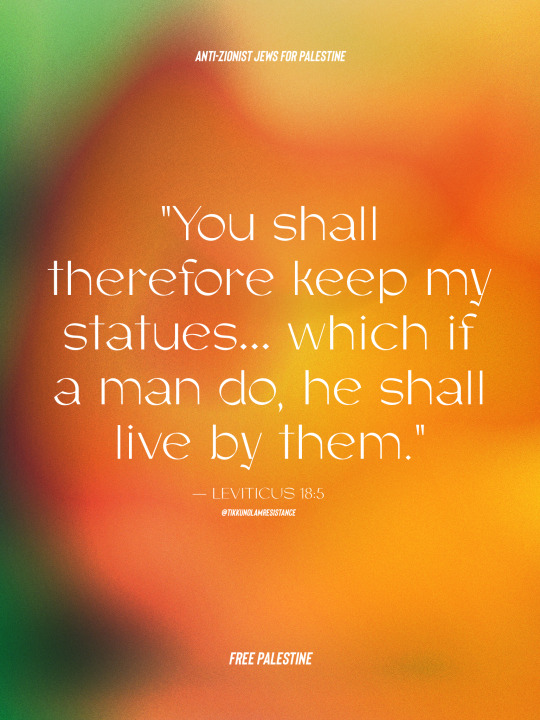#jewish law
Text
Why aren't ostriches kosher? A case-study for Kashrut laws
Unlike mammals and fish, the Torah does not provide a list of signs that identify a bird as kosher or non-kosher. Instead, it provides a list of non-kosher birds in Leviticus 11:13-19, and they are:
נֶּ֙שֶׁר֙- Eagle
פֶּ֔רֶס- Vulture (or Kite)
עׇזְנִיָּֽה- Black vulture (or Osprey)
דָּאָ֔ה- Kite (or Kestrel)
אַיָּ֖ה לְמִינָֽהּ- Falcon (or Vulture) of every variety
כׇּל־עֹרֵ֖ב לְמִינֽוֹ- All varieties of Raven
בַּ֣ת הַֽיַּעֲנָ֔ה- Ostrich
תַּחְמָ֖ס- Nighthawk (or Jay, or Goatsucker, or some species of Owl)
שָּׁ֑חַף- Gull (or Sparrow hawk)
נֵּ֖ץ לְמִינֵֽהוּ- Hawks of every variety
כּ֥וֹס- Little owl (or just Owl)
שָּׁלָ֖ךְ- Cormorant (or Gull)
יַּנְשֽׁוּף- Great owl
תִּנְשֶׁ֥מֶת- White owl
קָּאָ֖ת- Pelican (or Starling)
רָחָֽם- Bustard (or Magpie)
חֲסִידָ֔ה- Stork
אֲנָפָ֖ה לְמִינָ֑הּ- Herons of every variety
דּוּכִיפַ֖ת- Hoopoe
עֲטַלֵּֽף- Bat
The Torah repeats this list in Deuteronomy 14:11-18. As you can see, most of the species on this list are uncertain in translation (which is why I offered alternate translations), although you can see the general idea. But, we know 100% that ostrich is explicitly forbidden in the Torah, we don't even need to derive anything. The birds that are kosher are generally regarded as kosher based on unbroken tradition that they are (they are cases of birds no longer being considered kosher by most Jews despite them once being considered kosher, because the tradition was broken, but we'll get to that later).
Of course, there are many more birds species besides those listed, and very early on the Sages figured signs of kosher and non-kosher birds based on the list. First, as you can see, many of the birds on the list are birds of prey, so any birds of prey are automatically non-kosher. That was easy for them to figure out.
But what about anatomical signs?
Well, they figured that out, too. (Chullin 59a)
A bird that claws its prey and eats is non-kosher (such as birds of prey).
A kosher bird has a digit seperated slightler higher behind the other three toes, a crop, and/or a gizzard that has a membrane on the inside that can be peeled. Below is a comparison of raven feet and a parrot's foot, versus duck feet and chicken feet. On the left, the raven and parrot's feet have all their toes branching out of the same level. On the right, the duck and chicken feet's back toe is slightly elevated and seperate from the other toes.

A bird that perches on a wire with two toes in the front and two in the back is non-kosher, as demonstrated below by a close-up of a parrot's feet while perching. You can see that there are only two toes in the front, while the other two are in the back.

So, in order for a bird to be considered kosher, it must not be on the list of non-kosher birds provided in the Torah, must fulfil the anatomical descriptions outlined later by the Sages, and must have a tradition of being kosher.
Israel is the largest consumer of turkey meat per capita. This is because Jews eat a lot of turkey, including kosher-keeping Jews. But.....turkey is a New World bird! How can there be a tradition of turkeys being kosher if the ancient Israelites would have never encountered turkeys???
So this is where it gets even more interesting. When turkey was first introduced to Jews, it became widely popular. It's thought that Jews first started eating it because of its similarity to chicken, and assumed it must be kosher. Eventually, the Rabbis realized they had to make a decision about the status of turkeys. If they ruled turkeys as non-kosher, then all the Jews who had already been eating turkeys would be ruled as eating non-kosher, which y'know as a Rabbi you really don't want to declare a whole bunch of Jews as doing the wrong thing. So, most Rabbis relied on a passage in the Talmud stating that a non-kosher animal cannot become pregnant by kosher animals (Bekhorot 7a). Since turkeys and chickens can hybridize, Rabbis relied on this passage to declare turkeys as kosher. There are still some Jews today that don't regard turkey as kosher, but it is accepted as kosher by the majority of world Jewry and is a very popular meat.
What about peacocks? Well, peafowl are mentioned numerous times in the Tanakh and in Jewish history as being eaten, but today, the Orthodox Union does not certify them as kosher. Peafowl are genetically related to other kosher birds and have all the necessary signs.....but they are no longer considered kosher by major Orthodox opinions. This is because the last record of peafowl being considered kosher and eaten by a Jewish community was in the mid 19th century. The tradition was broken, and therefore peafowl aren't eaten or certified, despite the fact that they technically are kosher.
Now here's where is gets fun- somehow, the distinctions between kosher and non-kosher birds fit really neatly within our modern understanding of bird phylogeny. Most kosher birds fall under the Galliformes (chickens and friends) and Anseriformes (ducks and friends) Orders, which are more closely related to eachother than they are to any other Orders, and make up the Superoder Galloanserae. The only kosher birds that don't fall into that Superorder are pigeons and doves, but pigeons and doves are already considered a little different by the Sages- they're the only birds that can be used as offerings in the Temple. This is yet another example of how well the ancient Jewish animal classifications fit with out modern phylogenetic understanding, it's super cool. Because grebes and gallinules look a lot more similar to ducks than chickens do, but nope, they are not kosher while ducks and chickens are, and indeed, ducks and chickens are more closely related to each other than ducks are related to grebes and gallinules.
So, in conclusion- ostriches aren't kosher because
1) They are listed among the non-kosher birds in the Torah
2) They are missing toes- their toes are not in the configuration outlined in the Talmud, and in fact they only have two very large toes, as you can see below:

3) They do not have a crop (all ratites do not have crops)
Hope you enjoyed this long-winded way of answering why ostriches aren't kosher :)
Further Reading:
A Peafowl by any other Name
What Are the Signs of a Kosher Bird?
The Liberated Bird: Let’s Talk Turkey
192 notes
·
View notes
Note
Hello Hinda! I had a question I was curious if you had any insight into. I know that in Judaism, preservation of life is a top priority so much so that other laws can get thrown out if breaking them means saving a life. What does this mean for self-sacrifice/putting oneself directly in harms way to help others and/or sacrificing one life for the many type of decisions? I know that there are Jewish firefighters/paramedics/soldiers that do put themselves in harms way for the many so they are allowed to hold such jobs, I am just curious as to the more philosophical/legal opinions on such things. Thank you for your time :)
Hello, thank you for your question! I did a lot of searching to find this answer, because I've heard that self-sacrifice is both acceptable and unacceptable. Like most things in Judaism, there is no clear consensus.
In Leviticus 19:16 it states "One shall not stand idly by the blood of your neighbor." Jewish life places the preservation and saving of another life above everything else. As Nachmanides says: "Saving life is a great mitzvah. One who approaches it with alacrity is praised, one who hesitates is despicable, one who questions it is guilty of murder, and certainly so, one who despairs and does not do it." Therefore, we believe that saving another's life is of utmost importance. From this, many people have understandably concluded that if you were to intervene to save another's life, it would be permitted should you lose your own in the process. But this is not the case.
If we look to Yesodei haTorah (5.4), Maimonides argues that if you are threatened with death if you do not violate certain mitzvot, you should violate them instead of dying, except in regards to three specific transgressions. If you choose to sacrifice yourself needlessly instead of violating the mitzvot, you will be held accountable for the loss of life as if you had murdered someone in olam haba. He uses Leviticus 18:5 as justification, that concerning the mitzvot "which a man should perform and live by them." Maimonides states: "[They were given so that] one may live by them and not die because of them. If a person dies rather than transgress, he is held accountable for his life."
The three mitzvot that you should die rather than violate (if threatened) are the worship of other gods, forbidden sexual relations, and murder. A Jew should choose to sacrifice their life instead of violate these mitzvot ONLY if they are violating it in front of ten or more Jews. If there are less than ten other Jews present, one should "transgress and not sacrifice his life." If there are ten or more Jews present, it is considered a Chillul HaShem (desecration of His name) if you violate them in public.
Above all of this, if there is a government decree that signals that one might face a situation such as this, Jews are obligated to flee. Maimonides states: "One who could, however, escape and flee from under the power of a wicked king and fails to do so is like a dog who returns [to lick] his vomit. He is considered as one who worships false gods willingly. He will be prevented from reaching the world to come and will descend to the lowest levels of Gehinnom"
Rabbi Abraham Isaac Kook disagrees, and argues that if one sacrifices themselves in place of another, they are not violating the commandment to "live by" the mitzvot, because the commandment to live also applies to the victim. If one sacrifices their life for them, they are not violating the commandment to choose life, because they are choosing life, just not one that is their own. Simple, right? Except no, it's even more complicated due to two factors: who owns the body, and the value of each human life. According to Jewish law, God owns the body and He can take a life when He chooses, so it's not permitted for one to take their own life, even if it is to save another's. Finally, there is no way for a human to know whose life is considered more valuable than another's, so we're not allowed to make decisions based on this.
#i could write a whole essay on this#it is more complicated than one would think#jewish law#judaism#jumblr#frumblr#jewish#ask hinda
64 notes
·
View notes
Text

“You shall therefore keep my statutes…which if a man do, he shall live by them.” Leviticus 18:5
Pikuach Nefesh פקוח נפש is imperative to Halakha הֲלָכָה; the sanctity of life overrides any religious rule, it is most important and sacred. Yet, the State of Israel and the IDF brutally murder innocent Palestinian people in the name of Judaism? We stand by as the State that claims to define us defiles our very core values, taints our people. Zionism is not Judaism; it needs to be uprooted and abolished.
We abandon the very core values of our people to appease those who did nothing to protect us. We should not need to remind ourselves that all life is sacred.
FREE PALESTINE!
#judaism#halakha#jewish law#jewish#anti capitalism#anti imperialism#israel#palestine#free palestine#torah#talmud#jewish teachings
20 notes
·
View notes
Text
How would kosher food laws affect humans living with yautja? Would it just be based on safety concerns?
70 notes
·
View notes
Text


Matthew 5:17-20
Think not that I am come to destroy the law, or the prophets: I am not come to destroy, but to fulfil.
For verily I say unto you, Till heaven and earth pass, one jot or one tittle shall in no wise pass from the law, till all be fulfilled.
Whosoever therefore shall break one of these least commandments, and shall teach men so, he shall be called the least in the kingdom of heaven: but whosoever shall do and teach them, the same shall be called great in the kingdom of heaven.
For I say unto you, That except your righteousness shall exceed the righteousness of the scribes and Pharisees, ye shall in no case enter into the kingdom of heaven.
Galatians 5:4
Christ is become of no effect unto you, whosoever of you are justified by the law; ye are fallen from grace.
Do you follow Jesus or Paul? One or the other.
#Darwin Chandler#christianity#Paulanity#bible#jewish law#bible study#religion#no longer applies#religion is a mental illness
13 notes
·
View notes
Photo


31 notes
·
View notes
Text
Watching an old tv show got me curious: Is it okay to watch television during Sukkot?
3 notes
·
View notes
Text
Reform Judaism's stance on organ donation, as answered by Rabbi Billy Dreskin
As a registered organ donor and a prospective future bioethicist myself, this was a really interesting read!
12 notes
·
View notes
Text
If you need a somewhat less in-depth but more annotated, easier-to-follow source sheet on when Judaism allows abortion, this one's yours. Again, this is only looking at rabbinic sources that are lenient on abortion; there are plenty that rule more strictly.
#torah of reproductive justice#reproductive justice#torah study#abortion#abortion in judaism#halacha#jewish law#jumblr#source sheet
8 notes
·
View notes
Text
In this pride month its almost a year since i got my top surgery, which means its time to actually gather the courage to tell religious (jewish) woman that i am a boy as they come to sit next to me on the bus so they won't sit next to me and won't break Negiah accidentally.
Honestly did not expect how comforting and gender affirming this would make me omg, I don't mind men sitting next to me for now.
#transgender#transmasc#he/him for today#discovering the gender of the day in a positive way 😃#judaism#jewish#Negiah#jewish lgbt#jewish law
12 notes
·
View notes
Text
Way more than you want or need, unless you regularly enter into discussions with evangelical "Christians."
#abortion#Bible#cherry picking the bible#context matters#CHRINOs#reproductive rights#Jewish law#Muslim law#separation of church and state
4 notes
·
View notes
Text
Menachem Bluming Muses: Are You Old?
Old age is not so easy to define. For a professional football player, forty is already over the hill. On the other hand, there are budding authors in their eighties publishing their first book. So who is old?
We do need a clear answer. There is a mitzvah to “rise before the aged, and give deference to the old.” (Vayikra 19:32) This means more than just offering old people a seat on the bus. It means listening to what they have to say and taking their words seriously.
The mere fact that a person has been around for a while gives a level of credibility and weight to their opinion. Of course there are some very foolish octogenarians, and there are some very wise millennials. But nothing beats life experience. Elders deserve respect just because they have seen a lot.
But how old is an elder?
The most authoritative opinion in Jewish law (Shulchan Aruch Yoreh Deah 244:1) states that you are an elder and must be accorded honor from the age of 70.
But a most delightful definition of old age is found in the Talmud tractate Niddah 9b. It says that if people call you “oldie” and you take it as an insult, then you aren't old. But if you don't mind people calling you old, then you have earned the title of elder.
This is brilliant. As long as you are stuck in the cult of trying to stay young, you haven't reached the age of respectability. The sign that you have attained the level of mature wisdom is that you are comfortable being old. It's not an insult, it's an honor.
So let's test you, oldie.
How did that feel? Why did you just unsubscribe from my blog?!!
Mendel (Menacehm) Bluming and R"M etc
2 notes
·
View notes
Text
4 Completely Different Versions of the Story of Moses | Ancient Origins
https://www.ancient-origins.net/history-famous-people/which-real-story-moses-was-he-criminal-philosopher-hero-or-atheist-008008
View On WordPress
#Amenophis#Apis#Atrapanus#bible#Book of Exodus#Canaan#Chenephres#Cult of Apis#Egypt#Egyptian#Ethiopia#Exodus#Greek#Ibis#Jerusalem#Jewish#Jewish Law#Jews#Kosher Diet#Leper#Lepers#leprosy#Manetho#Memphis#monotheism#Moses#Osarsiph#Oxen#Pork#Priest
0 notes
Text
A general tip for students who are sending those dreaded Religious Absence Emails to your professors: Rather than asking permission to take the day(s) off, politely let them know that you will be taking the day(s) off.
In other words, consider not saying this:
"May I miss class on [date] so I can observe [holiday]?"
It's not that there's anything wrong with the above, per se. But because it's phrased as a request, it risks coming across as optional — a favor you hope to be granted. Problem is, favors are not owed, and so unfortunately asking permission opens the door for the professor to respond "Thanks for asking. No, you may not. :)"
Instead, try something along the lines of:
"I will need to miss class on [date] because I will be observing [holiday]. I wanted to let you know of this conflict now, and to ask your assistance in making arrangements for making up whatever material I may miss as a result of this absence."
This is pretty formal language (naturally, you can and should tweak it to sound more like your voice). But the important piece is that, while still being respectful, it shifts the focus of the discussion so that the question becomes not "Is it okay for me to observe my religion?", but rather, "How can we best accommodate my observance?"
Because the first question should not be up for debate: freedom of religion is a right, not a favor. And the second question is the subject you need to discuss.
(Ideally, do this after you've looked up your school's policy on religious absences, so you know what you're working within and that religious discrimination is illegal. Just in case your professor forgot.)
#this strategy got me through all of college#and some professors were a lot more supportive than others but no one ever told me no#because i didn't give them the chance#jumblr#judaism#religious absences#relevant to other minority religions as well#as well as non-religious accommodations#and non-school settings#dandelion says#jewish dandelion#note: the policy/legality details will vary depending on where you live and go to school#when i talk about religious discrimination laws this is based on public universities in the us
17K notes
·
View notes
Text
Watch "Judaism vs Christianity on Sin: Rabbi Tovia Singer Explains Why We Differ" on YouTube
youtube
1 note
·
View note
Text
Shavei Israel - Deputy Communications Director

Shavei Israel is a non-profit which assists the descendants of Jewish people and the Lost Tribes of Israel in reclaiming their roots. The organization is active throughout the world and acts as a starting point for those of Jewish heritage seeking to return. Shavei Israel was founded by Michael Freund with the intent of solidifying the connection between the Jewish people, their descendants around the globe, and the State of Israel.
1 note
·
View note